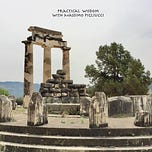“‘Shall we assume, then, that … the bad is akin to the bad; the good to the good; and what is neither good nor bad to what is neither good nor bad?’
They said they thought it was so: each was akin to its counterpart.
‘In that case, boys,’ I said, ‘haven’t we fallen back into those first statements of ours about friendship, which we rejected, since one unjust man will be a friend to another unjust man, a bad man to another bad man, no less than one good man to another good man?’
‘It would appear so,’ they said. …
‘Then I don’t know what more to say.’
With that I was intending to provoke another of the older men into speaking. Just then, like evil spirits, Lysis’s and Menexenus’s tutors came over with the boys’ brothers, called to them, and told them to come home; it was already late. …
However, I did say, just as they were leaving, ‘Lysis and Menexenus, we’ve now made utter fools of ourselves, an old man like me and you, since these people will go away and say that we think that we’re friends of one another – for I consider myself one of your number – though we were not as yet able to find out precisely what a friend is.’”
(Lysis, 222c-223b)
Listen to this episode with a 7-day free trial
Subscribe to The Philosophy Garden: Stoicism and Beyond to listen to this post and get 7 days of free access to the full post archives.











